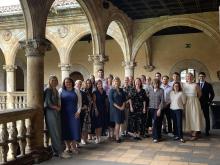Workshop for the Expert Research Group: “Best practices for remote participation in criminal proceedings”
Coordinators: Carolyn McKay (University of Sydney, Australia), Dorris de Vocht (Tilburg University, Netherlands), Lisa Flower (Lund University, Sweden), Christina Peristeridou (Maastricht University, Netherlands), Karolina Kremens (Uniwersytet Wrocławski, Poland)
Description of the meeting
Participating in criminal proceedings via video link has become routine in courts across the globe, enabling judges, prosecutors, lawyers, defendants, and witnesses to appear in proceedings remote from the courtroom. Yet, video links often prove insufficient for replacing physical presence in a courtroom and risk jeopardising human rights, procedural fairness and the legitimacy of courts. It is therefore paramount that we understand the social utility, benefits and potential hazards, and critically engage with the digitalisation of the criminal courtroom as an essential civic institution. The significance of the problem is seen in the widespread implementation of video links during the COVID-19 pandemic, for instance in Norway, Kenya, Ireland, England, Switzerland, the US, Canada, New Zealand, and Australia. In the Basque Country, courtroom video links are a prioritised area of development.
The overall rationale is to workshop an interdisciplinary approach to establishing best practice guidelines for remote participation and remote advocacy while ensuring procedural fairness, legitimacy and accountability of legal systems. The workshop will gather leading researchers and recognised experts from a range of disciplines particularly, sociological and socio-legal, in order to identify current gaps in knowledge and to create a research agenda for identifying best practice in virtual criminal procedures. It will provide a forum for critical and innovative thinking, interdisciplinary knowledge pooling, and collaboration.
The Virtual Criminal Justice Workshop will be structured around the impact of virtual presence on courtroom communication, interaction, participation, evidence, rituals, advocacy, and due process. It will be forward-thinking in examining emerging technologies.
The workshop will build on the successful initial hybrid Virtual Criminal Trials symposium at Maastricht University, Netherlands, 2023, and the 2024 Virtual Criminal Justice Network Conference at Lund University, Sweden. The convenors of this workshop have also founded the Virtual Criminal Justice Network (VCJN), a multidisciplinary and international network of scholars interested in video links in court. This workshop will enable the VCJN to continue its vital work in exploring video links and more firmly establishing its network collaborations.
Our experience in Oñati
Thank you for hosting our 2025 ‘Workshop for the Expert Research Group: Best practices for remote participation in criminal proceedings’ for our Virtual Criminal Justice Network. The whole experience was extremely positive: from proposal, organisation, programming and travel arrangements, through to the actual event. Particular thanks to Malen Gordoa for her guidance and professionalism.
Our workshop was not a conventional conference. Instead, we ran it as a think-tank for international and interdisciplinary experts, aimed at being dialogical, reflective, and generative. Participants were encouraged to be active listeners and co-creators. While this was a novel and experimental format for us all, we had spent considerable time beforehand preparing each session using ‘prompts’ or provocations from our participants.
Day 1 was exploratory and diagnostic based on two thematic sessions relating to virtual criminal justice, with the final session being devoted to research methodologies and future imaginings. We also introduced our participants to ‘journalling’, an exercise aimed at gathering their reflections at the end of the first day. Participants were asked to respond to:
- What did you learn today and/or what were the most interesting points raised?
- What gaps do you see in this field (in methodology, topics, focus)?
- In your view, how should we move forward in researching or shaping remote criminal justice?
On Day 2, we collated the journal reflections to inform our discussions aimed at identifying what we had learned, major gaps in the field, and outlining shared research directions. The goal was to clarify what matters most going forward — and how we want to shape that future. By the end of the workshop, we had collectively agreed that we would like to propose a Special Issue for the Oñati Socio-Legal Series.
We felt that the workshop was very successful. It provided us with a space in beautiful Oñati for thinking together, speculating boldly, critiquing respectfully, and above all imagining better ways of administering and studying justice in digital times. The workshop also enabled the Virtual Criminal Justice Network to continue to develop as an international and interdisciplinary network of scholars and practitioners, and facilitated the emergence of new research collaborations.
Associate Professor Dorris de Vocht, Tilburg University
Associate Professor Lisa Flower, Lund University
Professor Karolina Kremens, Uniwersytet Wrocławski
Associate Professor Carolyn McKay, University of Sydney
Dr Christina Peristeridou, Maastricht University
Workshop Coordination Team
Avenida de la Universidad, 8
Apartado 28
20560 Oñati (Gipuzkoa) - Spain
T: +34 943 78... Ver teléfono
E: workshop@iisj.es




